|
Size: 4277
Comment:
|
← Revision 81 as of 2016-06-10 15:39:44 ⇥
Size: 9549
Comment:
|
| Deletions are marked like this. | Additions are marked like this. |
| Line 11: | Line 11: |
| It is intended to be a small workshop (10 to 15 people) focusing on coding sprints. | The workshop started on wednesday 04 morning and ended on saturday 07. It took place at [[http://www.pmc.gob.mx/|Punto Mexico Conectado @ Oaxaca]] in [[https://www.google.com.mx/maps/place/Punto+M%C3%A9xico+Conectado+Oaxaca/@17.0630565,-96.7325754,19z/data=!4m2!3m1!1s0x85c722148d9070eb:0x431c6d96d211d5b5|calzada Madero numero 101]]. |
| Line 13: | Line 13: |
| == Previsional schedule == | == Schedule == |
| Line 16: | Line 16: |
| ||<#FFFFAA> morning ||<#AFEFEF:> Participant presentation<<BR>>and<<BR>>Sage introduction || ? || ? || ? || ||<#FFFFAA> 13:00 - 14:30 || lunch break || lunch break || lunch break || lunch break || ||<#FFFFAA> afternoon || ? || ? || ? || ? || |
||<#FFFFAA> 09:00 - 10:00 || registro y instalación || coding sprint || coding sprint || ? || ||<#FFFFAA> 10:00 - 11:00 || presentación de Sage || coding sprint || coding sprint || ? || ||<#F8F8FF> 11:00 - 11:30 ||<#F8F8FF> té y café ||<#F8F8FF> coffe break ||<#F8F8FF> coffe break ||<#F8F8FF> coffe break || ||<#FFFFAA> 11:30 - 13:00 || actividades practicas || coding sprint || sharing code howto || status report || ||<#CCCCFF> 13:00 - 14:30 ||<#CCCCFF> lunch break ||<#CCCCFF> lunch break ||<#CCCCFF> lunch break ||<#CCCCFF> lunch break || ||<#FFFFAA> 14:30 - 15:30 || presentation / discussion || coding sprint || coding sprint || FREE || ||<#FFFFAA> 15:30 - 17:00 || tutorial: symbolic vs numeric || coding sprint || coding sprint || FREE || ||<#F8F8FF> 17:00 - 17:30 ||<#F8F8FF> coffe break ||<#F8F8FF> coffe break ||<#F8F8FF> coffe break || FREE || ||<#FFFFAA> 17:30 - 18:00 || Pat Hooper's demo || Vincent's demo || Charles's demo || FREE || ||<#FFFFAA> 18:00 - 19:00 || coding spring || status report || coding sprint || FREE || |
| Line 22: | Line 29: |
| * (tutorial / presentation) Pat Hooper: [[https://github.com/videlec/sage-flatsurf|Flatsurf]] | * Presentación de Sage, (jupyter notebook [[attachment:Sage presentation.ipynb]] [[attachment:Sage presentation.pdf]]) |
| Line 24: | Line 31: |
| * (tutorial / presentation) Vincent Delecroix: [[http://www.labri.fr/perso/vdelecro/flatsurf.html|the flatsurf package]] (warning: distinct from the above!) | During the elaboration of the talk it appeared that many things differ between the jupyter and Sage notebook. It was reported on the mailing list [[https://groups.google.com/forum/#!topic/sage-devel/OO64qyj65oo|sage-devel]]. Some of the problem are already fixed (see e.g. [[http://trac.sagemath.org/ticket/20562|#20562]])! |
| Line 26: | Line 33: |
| * ? (tutorial) number types in Sage: integers, rationals, number fields, symbolic, floating point, intervals, balls | * '''symbolic vs numerics in Sage''' (tutorial, wednesday 15:30 - 17:00, Vincent Delecroix) There are many ways to deal with numbers within Sage (algebraic numbers, floating points, intervals, ...). We will present and illustrate pros and cons of all of them on some concrete problems: root finding, integration, solving ordinary differential equations. [[attachment:symbolic_vs_numeric.rst]] |
| Line 28: | Line 36: |
| * ? (tutorial) SL2Z and triangle group code in Sage | * [[https://github.com/videlec/sage-flatsurf|Flatsurf]] Pat's demo: [[attachment:Hooper-sage_days_73-demo1.sws | Demo 1 as a Sage Worksheet]] [[attachment:Hooper-sage_days_73-demo1.pdf | Demo 1 as a PDF]] [[attachment:Hooper-sage_days_73-demo2.sws | Demo 2 as a Sage Worksheet]] [[attachment:Hooper-sage_days_73-demo2.pdf | Demo 2 as a PDF]] |
| Line 30: | Line 38: |
| * ? (tutorial) graphs and digraphs in Sage ([[http://doc.sagemath.org/html/en/reference/graphs/index.html|Sage graph stuff]] and possibly [[http://www.tcs.hut.fi/Software/bliss/|bliss software]], [[http://pallini.di.uniroma1.it/|nauty and Traces]], [[http://igraph.org/redirect.html|igraph]], ...) | * [[http://www.labri.fr/perso/vdelecro/flatsurf.html|the flatsurf package]] (demo, thursday 17:30 - 18:00, Vincent Delecroix) * '''computing Lyapunov exponents of the Teichmueller flow''' (demo, friday, 17:30 - 18:00, Charles Fougeron): CHARLES WORKHSEET TO COME |
| Line 34: | Line 44: |
| * infinite index subgroups of SL2Z | === Teichmûller polynomials === |
| Line 36: | Line 46: |
| * arbitrary subgroups of SL2R, SL2C | people: Ferrán |
| Line 38: | Line 48: |
| * construct SL2Z subgroups (SL2R?, SL2C?) from a set of generators | * need train-tracks automata with decorations. Then compute effectively dilatations in a given fibered face, Thurston norm, etc |
| Line 40: | Line 50: |
| * Lyapunov exponents, volume, Siegel Veech constants | * Explore Thierry's Coulbois [[https://github.com/coulbois/sage-train-track|train-track code]] |
| Line 42: | Line 52: |
| * Delaunay triangulations | The algorithm that given the (decorated) train-track algorithm produces the Teichmueller polynomial is ready!! Remains to produce automatically these graphs. |
| Line 44: | Line 54: |
| * ... ''add your own project'' ... | {{attachment:teichpol0-small.png}} {{attachment:teichpol1-small.png}} === flatsurf Package(s) === people: Charles, Pat, Vincent Build a nice Sage module for all translation surface related stuff. The aim is to * merge four distinct projects * Pat and Vincent [[https://github.com/videlec/sage-flatsurf|sage-flatsurf]] * Vincent [[http://www.labri.fr/perso/vdelecro/flatsurf.html|flatsurf]] * Charles code about Lyapunov exponents [[http://trac.sagemath.org/ticket/16102|trac ticket #16102]] * [[http://math.rice.edu/~rm51/|programs by Ronen Mukamel]] * add more stuff * Teichmueller flow for genus 1 quadratic differentials with Riemann theta functions * More for infinite translation surfaces * Thurston-Veech construction === visualize Teichmueller spaces === people: Maxime, Kasra * geodesics, balls, triangles, ... Needs computing Teichmueller maps, i.e. solving PDE * nice 3d plots to make animations of geodesic in Teichmueller space A nice animation of a Teichmueller geodesic embedded in R3 (four time punctured sphere): {{attachment:twist-small.gif}} {{attachment:P2A-small.gif}} Given two complex structures on the pentagon, the first plot represents the graph of (half the logarithm of) the ratio of extremal lengths with respect to these structures, as a function on measured foliations. The next two plots are the derivative and second derivative respectively. {{attachment:Maxime-graph3.png}} {{attachment:Maxime-graph4.png}} {{attachment:Maxime-graph5.png}} === visualize the translation structure induced by a not so nice differential === people: Anja {{attachment:flat_picture_of_z-quared-dz.png}} {{attachment:other_flat_picture_of_z-quared-dz.png}} === Generating saddle connections in a given surface and study their statistics *efficiently* === people: Grace Distribution of gap of saddle connection for a surface defined on a cubic field! {{attachment:sd.png}} === Computing quadratic differentials on tori === people: Charles Using Weirstrass function one can find explicit formulas for quadratic differentials on tori {{attachment:Charles-gen_meromorphic_p0_z0.87_0.72I.png}} === other projects === * Compute properties of Coxeter or Artin groups (normal forms, ...) * Incidence relations for vector space over Z/2Z (done!) * Subgroups of SL(2,R) given from generators. Design an algorithm that given a finite set of matrices in SL(2,R) answers whether the group generated by these is 1. not discrete 2. has finite covolume 3. has infinite covolume In case 2. and 3. the algorithm should also output a fundamental domain and generators in canonical forms. (Charles, Vincent) * Affine interval exchange transformations: rotation number for affine circle homeos, generalized Rauzy induction, hyperbolicity, periodic points, ... (Charles) |
| Line 60: | Line 151: |
| * [[http://www.math.udel.edu/~driscoll/SC/|Schwarz-Christoffel Toolbox in Matlab]] |
|
| Line 65: | Line 158: |
| == Preliminary list of participants (to be confirmed) == | == Participants == |
| Line 82: | Line 175: |
| This workshop is supported by the ERC H2020 project [[http://opendreamkit.org/|OpenDreamKit]]. | This workshop is supported by the ERC H2020 project [[http://opendreamkit.org/|OpenDreamKit]] and [[http://www.pmc.gob.mx/|Punto Mexico Conectado @ Oaxaca]]. |
Sage Days 73 in Oaxaca, Mexico May 04-07 2016
Sage is an open source software for mathematics. This is the webpage for the Sage workshop prior to the conference Flat Surfaces and Dynamics of Moduli Space to be held in Oaxaca May 08-13. The aim is to:
- introduce Sage to people from Oaxaca or assisting to the conference
- have program and code presentations about geometry and dynamics of surfaces
- help people to implement their own projects
The workshop started on wednesday 04 morning and ended on saturday 07. It took place at Punto Mexico Conectado @ Oaxaca in calzada Madero numero 101.
Schedule
|
Wednesday 4 May |
Thursday 5 May |
Friday 6 May |
Saturday 7 May |
09:00 - 10:00 |
registro y instalación |
coding sprint |
coding sprint |
? |
10:00 - 11:00 |
presentación de Sage |
coding sprint |
coding sprint |
? |
11:00 - 11:30 |
té y café |
coffe break |
coffe break |
coffe break |
11:30 - 13:00 |
actividades practicas |
coding sprint |
sharing code howto |
status report |
13:00 - 14:30 |
lunch break |
lunch break |
lunch break |
lunch break |
14:30 - 15:30 |
presentation / discussion |
coding sprint |
coding sprint |
FREE |
15:30 - 17:00 |
tutorial: symbolic vs numeric |
coding sprint |
coding sprint |
FREE |
17:00 - 17:30 |
coffe break |
coffe break |
coffe break |
FREE |
17:30 - 18:00 |
Pat Hooper's demo |
Vincent's demo |
Charles's demo |
FREE |
18:00 - 19:00 |
coding spring |
status report |
coding sprint |
FREE |
Talks
Presentación de Sage, (jupyter notebook Sage presentation.ipynb Sage presentation.pdf)
During the elaboration of the talk it appeared that many things differ between the jupyter and Sage notebook. It was reported on the mailing list sage-devel. Some of the problem are already fixed (see e.g. #20562)!
symbolic vs numerics in Sage (tutorial, wednesday 15:30 - 17:00, Vincent Delecroix)
There are many ways to deal with numbers within Sage (algebraic numbers, floating points, intervals, ...). We will present and illustrate pros and cons of all of them on some concrete problems: root finding, integration, solving ordinary differential equations. symbolic_vs_numeric.rst
Flatsurf Pat's demo: Demo 1 as a Sage Worksheet Demo 1 as a PDF Demo 2 as a Sage Worksheet Demo 2 as a PDF
the flatsurf package (demo, thursday 17:30 - 18:00, Vincent Delecroix)
computing Lyapunov exponents of the Teichmueller flow (demo, friday, 17:30 - 18:00, Charles Fougeron): CHARLES WORKHSEET TO COME
Projects
Teichmûller polynomials
people: Ferrán
- need train-tracks automata with decorations. Then compute effectively dilatations in a given fibered face, Thurston norm, etc
Explore Thierry's Coulbois train-track code
The algorithm that given the (decorated) train-track algorithm produces the Teichmueller polynomial is ready!! Remains to produce automatically these graphs.
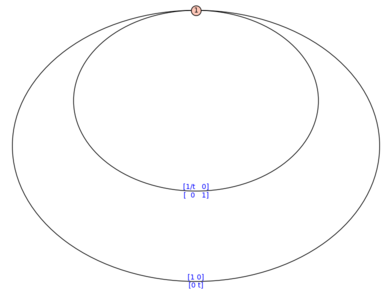
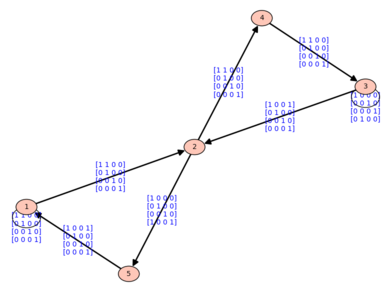
flatsurf Package(s)
people: Charles, Pat, Vincent
Build a nice Sage module for all translation surface related stuff. The aim is to
- merge four distinct projects
Pat and Vincent sage-flatsurf
Vincent flatsurf
Charles code about Lyapunov exponents trac ticket #16102
- add more stuff
- Teichmueller flow for genus 1 quadratic differentials with Riemann theta functions
- More for infinite translation surfaces
- Thurston-Veech construction
visualize Teichmueller spaces
people: Maxime, Kasra
- geodesics, balls, triangles, ... Needs computing Teichmueller maps, i.e. solving PDE
- nice 3d plots to make animations of geodesic in Teichmueller space
A nice animation of a Teichmueller geodesic embedded in R3 (four time punctured sphere):
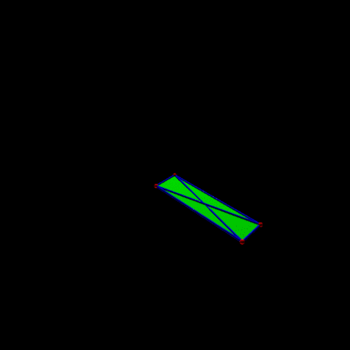
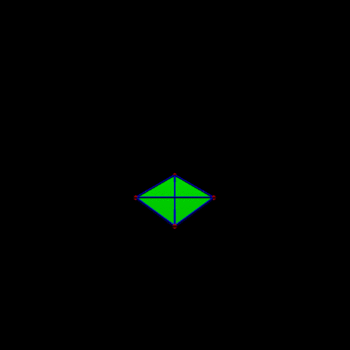
Given two complex structures on the pentagon, the first plot represents the graph of (half the logarithm of) the ratio of extremal lengths with respect to these structures, as a function on measured foliations. The next two plots are the derivative and second derivative respectively.
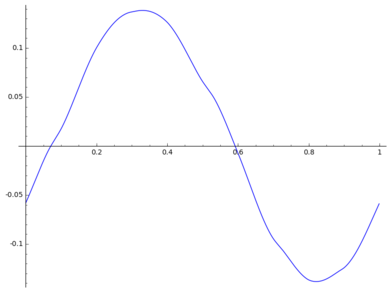
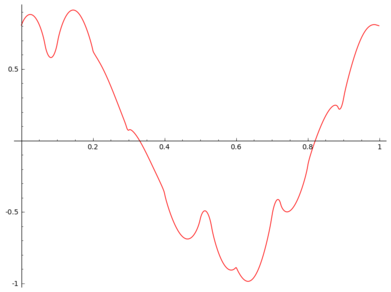
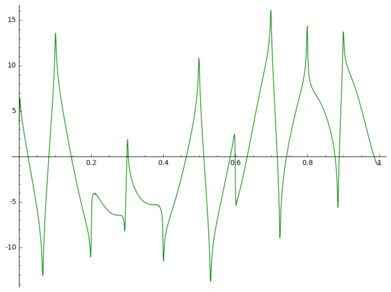
visualize the translation structure induced by a not so nice differential
people: Anja
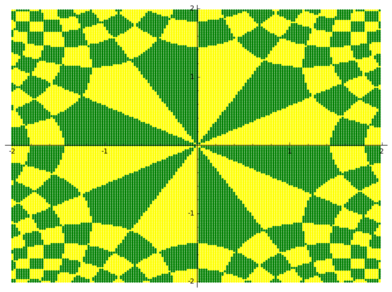
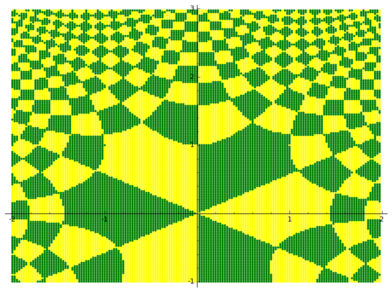
Generating saddle connections in a given surface and study their statistics *efficiently*
people: Grace
Distribution of gap of saddle connection for a surface defined on a cubic field!
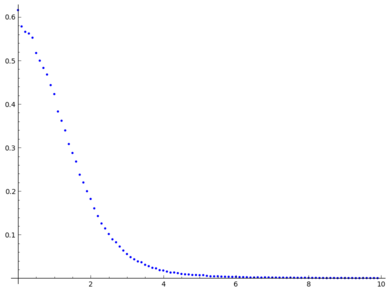
Computing quadratic differentials on tori
people: Charles
Using Weirstrass function one can find explicit formulas for quadratic differentials on tori
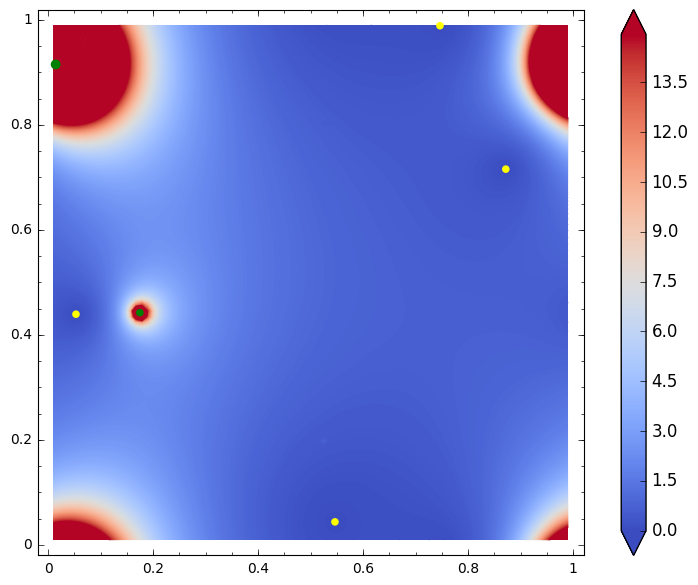
other projects
- Compute properties of Coxeter or Artin groups (normal forms, ...)
- Incidence relations for vector space over Z/2Z (done!)
- Subgroups of SL(2,R) given from generators. Design an algorithm that given a finite set of matrices in SL(2,R) answers whether the group generated by these is
- not discrete
- has finite covolume
- has infinite covolume
- Affine interval exchange transformations: rotation number for affine circle homeos, generalized Rauzy induction, hyperbolicity, periodic points, ... (Charles)
Existing programs about translation surfaces
- Alex Eskin code (saddle connection exploration + decomposition in cylinders)
various programs by Ronen Mukamel (Delaunay triangulations, Teichmueller curves especially in genus 2)
Vincent Delecroix flatsurf package (mostly interval exchanges and square tiled surfaces, but a bit of topology)
Vincent Delecroix and Pat Hooper drawing program
Charles Fougeron code for Lyapunov exponents of strata coverings (see trac ticket #16102)
Chris Swierczewski Riemann surfaces package
Organizers
Participants
Thierry Monteil (might attend remotely)
Chris Swierczewski (might attend remotely)
Support
This workshop is supported by the ERC H2020 project OpenDreamKit and Punto Mexico Conectado @ Oaxaca.
